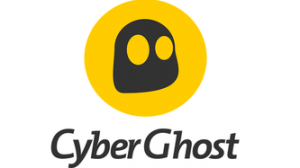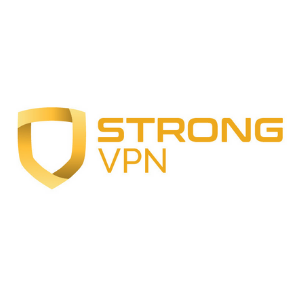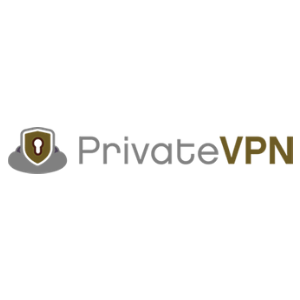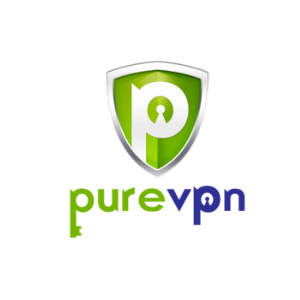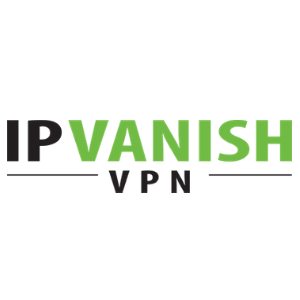We are a participant in the Amazon Services LLC Associates Program, an affiliate advertising program designed to provide a means for us to earn fees by linking to Amazon.com and affiliated sites.
Best VPNs - 2018
Each time that you visit a website, you leave behind traces of your private data. The best VPNs for 2018 help you retain your privacy as you surf the web. This abbreviation stands for virtual private network and refers to an application that keeps your data secure.
While there are different types of VPNs available, the type that you buy isn’t as important as the product itself. You want an app that gives you complete freedom and one that won’t slow down your computer or your operating system. A good network will reroute your system and keep others from accessing your location or finding any of your private information.
The top products for 2018 are those that you can download right to your computer. You’ll typically pay a small amount of money to get the security and protection that you need, though some apps are actually free. We’ll take a look at the top VPNs for 2018 to help you decide which one is best for the things you do online.
Who Benefits From a VPN?

Social Follow
Follow us on:
Get exclusive content, advice and tips from Honest Product Reviews delivered to your inbox!
VPN Review: NordVPN
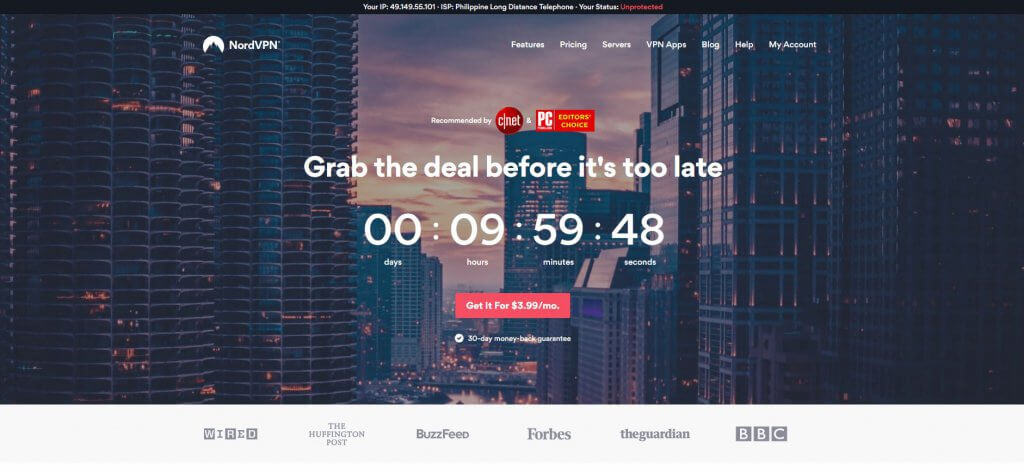
Many websites and experts picked NordVPN as one of the best or the best VPN for 2018. With around 2,000 IP addresses to choose from, it allows you to change your location in seconds. Though the company itself has its headquarters in Panama, it lets you pick from 60 different countries around the world. If you ever wanted to see what Netflix offers for residents of England, now is your chance. Many companies only let you use up to five connections at one time, but this one lets you use six connections. The only real downside to this one is that the network is smaller than some of the others that we found. You may find that it doesn’t do as good of a job as hiding your internet footprint as you would like.
One thing you should consider is how much a VPN costs. NordVPN is available in several different package options. If you decide to pay for a year in advance, you’ll pay $69, which gives you 12 months of service. Its three-year plan is the most affordable though. When you pay for a year in advance, the company charges you just $2.75 per month. You can also sign up for a monthly plan that charges you $11.95 per month. This is a great option for those who want to try out the network before they commit to a longer time frame.
- Ranked by multiple sites as the top VPN for 2018
- Gives you access to more than 4,000 servers in more than 60 countries
- Three-year service plan significantly reduces the total cost
- Yearly plans are more expensive than those offered by other companies
- Overall network is a little small
- Requires personal contact to get and set up a dedicated network
VPN Review: ExpressVPN
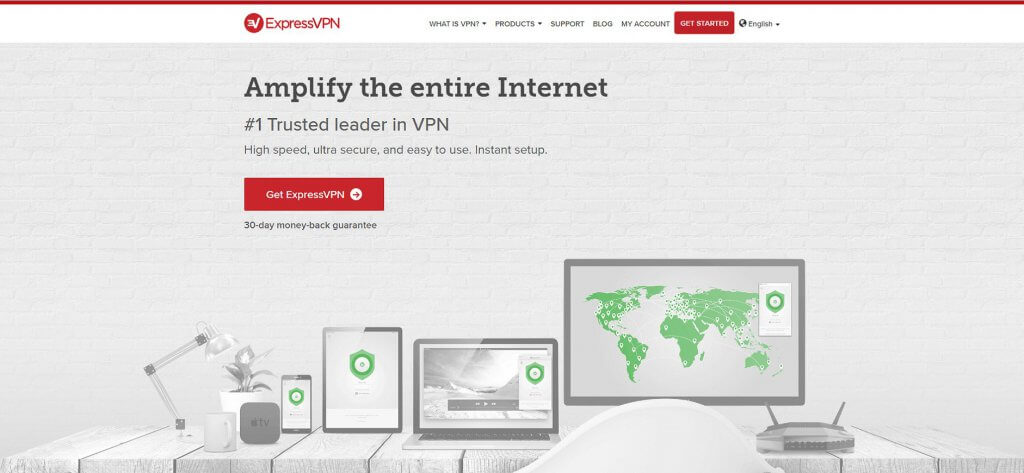
ExpressVPN offers support for all types of devices and internet connections as well as all types of users. With more than 1,700 servers located in 94 countries, this provider makes it easy for you to find the right network based on what you want to do online. The company itself has a location in the British Virgin Islands, but it offers location support for people who live or want to appear as if they live in major destinations around the world. You can use bitcoin to pay for the plan that you want. When you sign up for its most expensive plan, the company will give you three months of service for free. Though you will need to pay for multiple months up front, you’ll pay less than $7 per month.
Two things we really like about ExpressVPN is that it has a kill switch feature and it offers helpful information on its website. The FAQ it provides is one of the most detailed around. This section walks you through how to use the VPN and answers some of the more common questions that users have. You can also pick up tips on using the VPN and making changes to your network.
VPN Review: CyberghostVPN
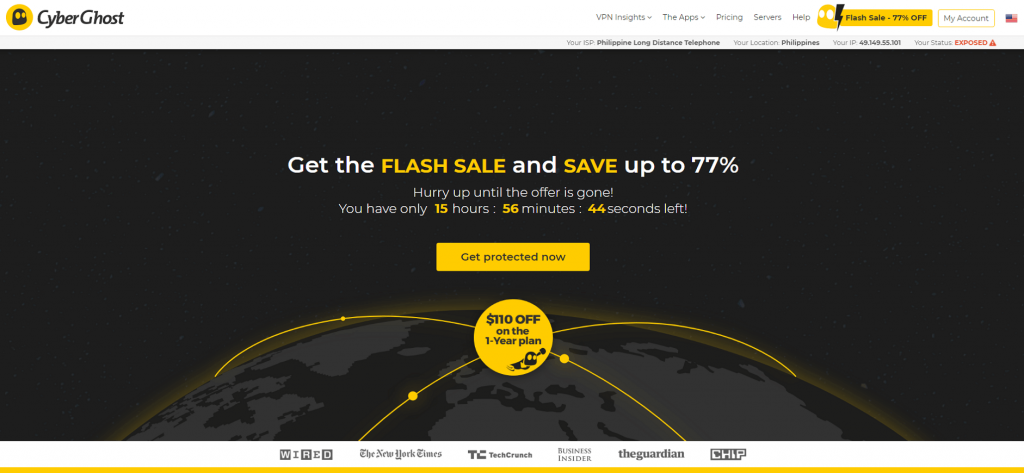
Cyberghost VPN offers a variety of payment plans that make it easy for to you try it out and see how it will work for you. When you sign up for one month of service at a time, you’ll pay $12.99 per month, which makes this more expensive than other VPNs. You can get six months of service when you pay for all six months in advance, which will drop your overall price to just $7.99 a month. The best value option for those who love this service is a yearly plan that charges you $3.50 a month and gives you six months of free service. You can try any of these packages and get your money back because the company offers a 45-day money back guarantee.
As a VPN, Cyberghost is a solid choice because it has an account set up that lets you quickly create a new account once you download it to your computer. It shows you the total number of people using a VPN around the world and lets you pick the country and region that you want to use from more than 100 options. You can also use this with P2P sharing and when downloading torrents, though it doesn’t offer support for all regions. Some users also thought the interface was a little too complicated.
- Offers plans at multiple price points and one that gives you six free months
- You get a money back guarantee that lasts for up to 45 days
- Easy to set up and use a new account
- Lets you change your location and pick from more than 100 regions
- Has pretty fast processing speeds
- Is fairly expensive when compared to other products
- Does not offer the P2P or torrent support in all areas that you might need
- The userface is too messy and complicated
- Comes with limited live support
VPN Review: StrongVPN
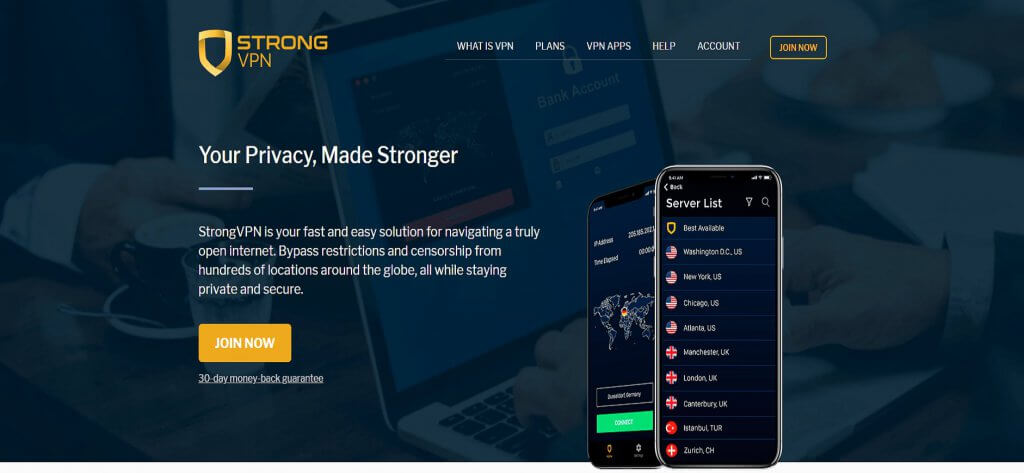
StrongVPN also gets great reviews from those who used it in the past. Unlike other networks that require you log in, which can slow you down, this one opens automatically whenever you turn on your computer or use a web browser. If you want to remain completely anonymous while on the web, this is a solid choice for you. It has multiple servers located all over the world and allows you to pick the location that you want to use as you browse.
One reason so many users like StrongVPN is because it lets them frequently change their IP addresses and allows them to use a dedicated IP address. Let’s say that you’re right in the middle of watching a television show on Netflix. If you accidentally log in without updating your location, you may find that Netflix prevents you from watching that show. Netflix can even ban your account because it thinks you used privacy software. When you pick a dedicated IP address, you don’t need to adjust your computer each time you use the site. StrongVPN lets you sign up for a monthly plan and pay just $10 per month, or you can sign up for a yearly plan and pay $69.99 for a year of service.
VPN Review: PrivateVPN
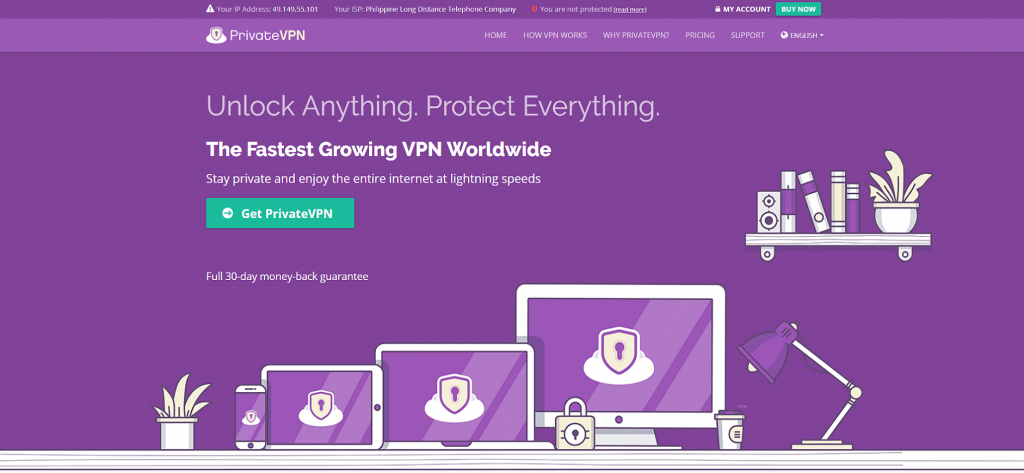
One of the fastest operating networks and one of the easiest to use is PrivateVPN. Thanks to its 30-day guarantee, you can try out of this network without worrying about losing any money. The company makes it easy for you to get in touch and request a refund. Many of the reviews we found claimed that the company refunded their money quickly too. The customer support this company offers covers more than just refunds though. You can also get help changing the network settings and using it with devices other than your computer.
Most of the reviews on this VPN are quite positive and point out nice features such as the mobile apps that are available, which protect your mobile devices from online threats. You can also use multiple devices on the same network and use up to six connections at the same time. Though the company only has servers in a little more than 50 countries, it has more than 80 servers available. As the company grows, you’ll find that the number of servers will also grow. While many people like this VPN today, a small number of users found that it runs a little slower than other VPNs.
VPN Review: PureVPN
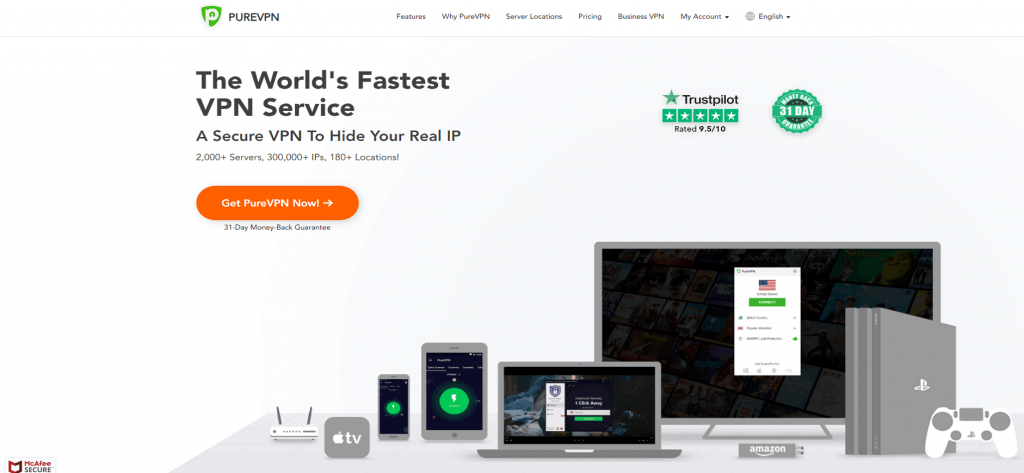
Very few companies in this sector offer a money back guarantee, which is one of the things that sets PureVPN apart from its competitors. If you are unhappy with the service at any point within the first 30 days of becoming a customer, you can request a full refund. Located in Hong Kong, this service provider has locations in 180 locations and gives you access to nearly 200 servers. You can also set up an IP address located in one of nearly 100,000 areas. If you really want privacy online, you’ll like that PureVPN is one of the few companies operating today that will accept bitcoin as payment. Customers pay $69 for a three-year plan or around $11 for the company’s monthly plan.
PureVPN offers support for all types of devices and software too. Those who use Kodi on any of their devices will find that they can access restricted content through the network when they connect it. You can also use this network when surfing the web or watching videos on a Chromebook. While many providers offer support for traditional laptops, PureVPN is one of the only with Chromebook support. The only thing you may not like about this company is that it does log some of your data. You can find out what data it logs before you become a customer.
VPN Review: IPVanish VPN
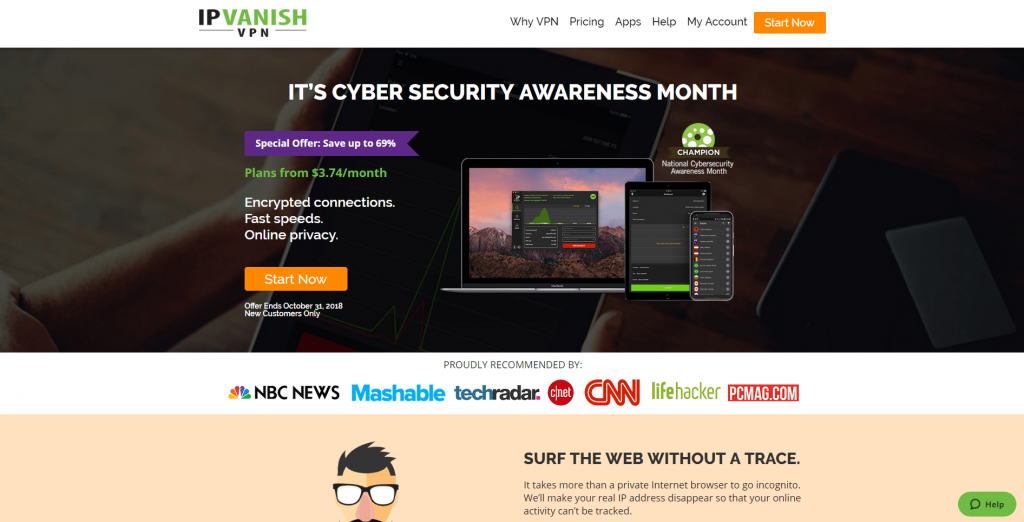
IPVanish is a VPN provider that lets you choose from more than 40,000 IP addresses. Some of the paid services and most of the free services we found will keep a log of your online activities, even if the providers claim to keep your private information private. IPVanish is one of the only companies we found that does not monitor or track your actions. We give this company our seal of approval because its lack of records means that it cannot share or sell your data to anyone else. This service is suitable for most devices, including cell phones and the Amazon Firestick.
Many users today who have streaming devices download Kodi because it gives them access to thousands of videos and shows. IPVanish offers its own plugin that works with Kodi. Once you download this plugin, you can use your Kodi to access content that your country or region restricts. If you aren’t sure how well this option will work for you, you can sign up for a free trial. You get up to seven days to use the service before you commit to buy. Those who sign up for the monthly plan pay $7.50 a month, but you can get one full year of service for less than $60. We also like that this company is based out of the United States but has 900 servers in 60 countries.
VPN Review: VyprVPN
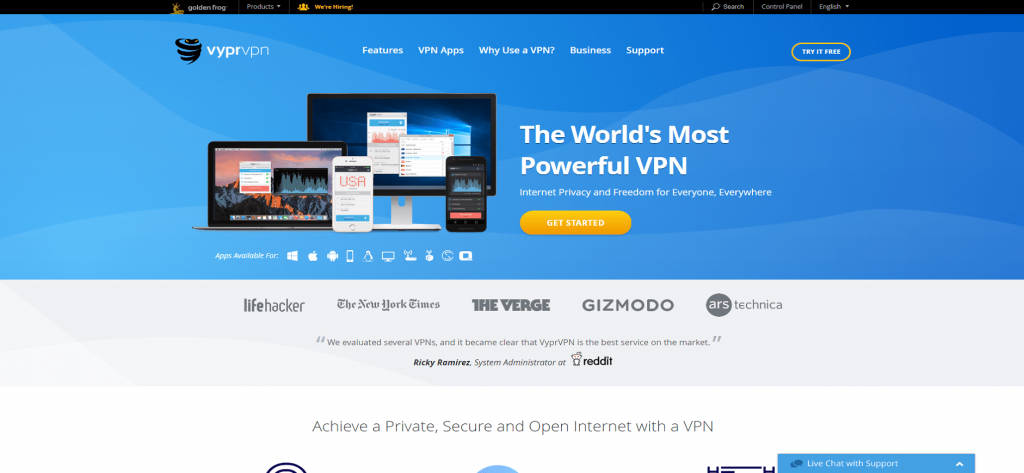
Best VPN is a website that keeps track of the top VPN providers, and the site nominated VyprVPN for multiple awards for 2018. The company bills itself as “The World’s Fastest VPN” and offers versions of its VPN for all types of devices. You’ll find versions designed for Windows operating systems and for devices that use a Linux, Apple or Android system. There are even versions designed for mobile devices. This is one of the few services that you can try for free without feeling pressured to make a purchase. VyprVPN does ask for a credit or debit card number during the free trial period though. It will automatically charge that card for the plan you chose at the end of your trial.
An internet kill switch makes it easy to shut off the VPN quickly when you need. This service also runs quickly and won’t slow down your computer. Servers located in more than 70 countries give you access to all types of content from around the globe. One thing we don’t like about this service is that the free trial only lasts for three days. Some users didn’t like that the logs the VPN kept included only basic data.
VPN Review: Buffered
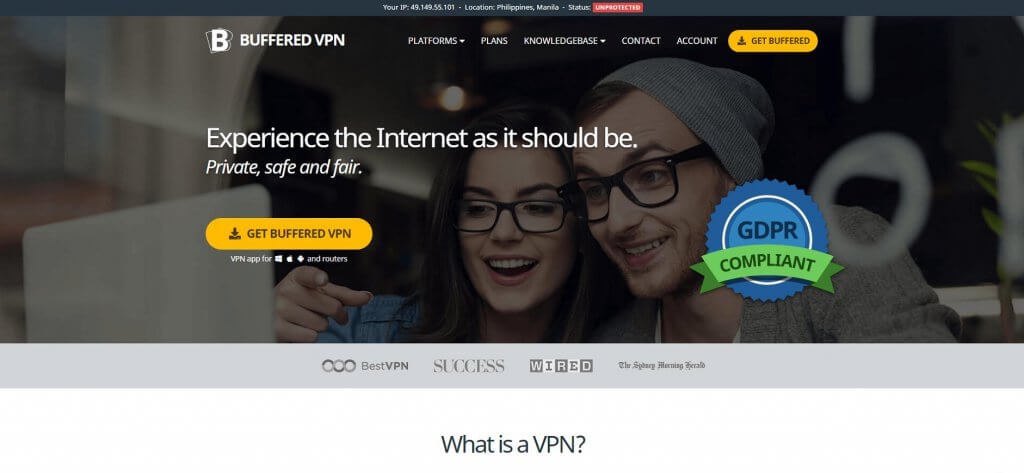
Depending on where you live, you may find that your country has strict laws in place regarding what you can download and even what you can do on the web. To help those living in Hungary do everything they want to online, several developers came together and created Buffered. Buffered offers support for peer-to-peer sharing networks and will let you visit almost any site. It comes with protection designed to keep you safe from data leaks and solid data encryption that keeps your info safe.
We like that the developers behind this VPN let you try it out for a full 30 days before requiring that you purchase one of its plans. Though you can sign up for a month-long plan for less than $15 a month, most users prefer one of the longer plans that help them save money. The annual plan costs less than $100 and charges you just once a year, while the biannual plan charges you a little under $60 twice a year. Buffered works particularly well for those who play games and watch videos online because it runs so quickly that you’ll never find those games or videos buffering.
VPN Review: Private Internet Access
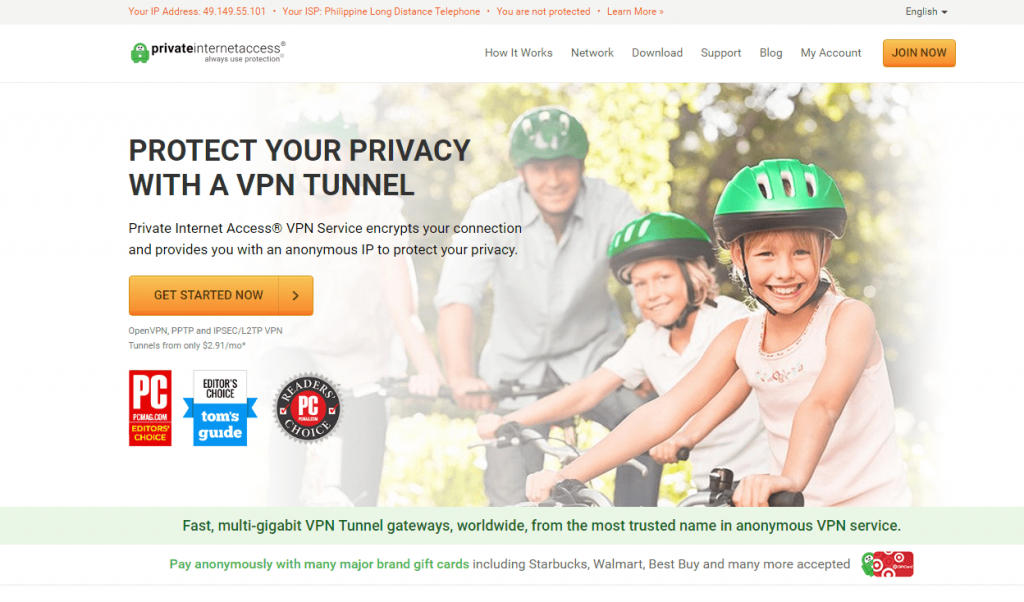
Private Internet Access offers an affordable and easy way to surf the web from anywhere in the world. Also called PIA, this is a VPN that gets positive reviews from a wide range of users. Those who like to share videos and get content from others via torrents and P2P networks like that it offers support for them, while others like that it gives them access to websites blocked in their regions. Thanks to its Plug n’ Play Router option, setting up the VPN with your router is incredibly easy. You can start browsing anonymously only minutes after buying this product.
PIA also allows multiple users to share the same IP address, which makes this a great choice for those who spend a lot of time on filing sharing servers. This makes it impossible for others to identify you. You can access a few thousand different servers in nearly 30 countries to remain as anonymous as possible. PIA offers a two-year plan, but you can also sign up for one month of service at a time or for a full year. The yearly plans drop your costs to well under $5 a month, while the monthly plan costs around $7 a month.
VPN Review: Hide My Ass
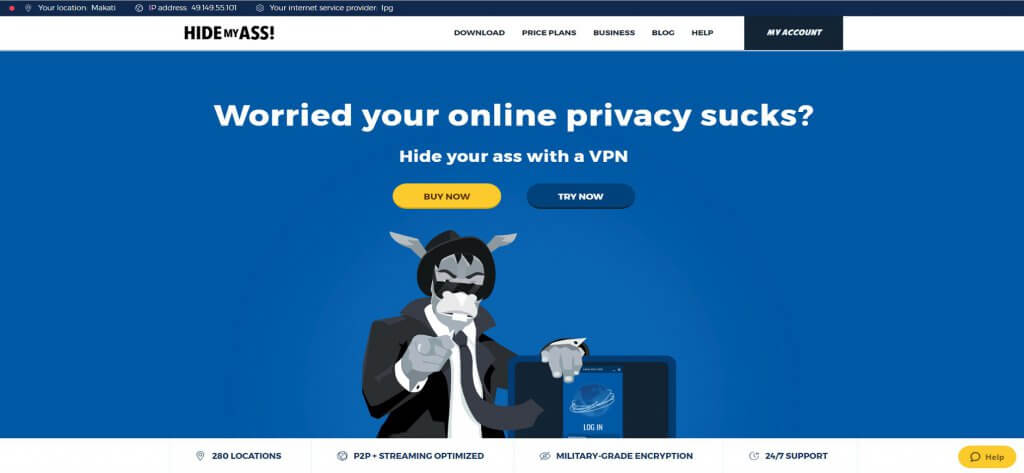
If the name of this VPN doesn’t make you laugh, the logo that the company uses certainly will make you giggle. Hide My Ass uses an image of a donkey in a trench coat and sunglasses as he surfs the web with his own computer and stays secure with this VPN. Based out of the United Kingdom, this VPN has more than 800 servers available in more than 200 locations. We wish that this service had more IP addresses available though. As it only has a little more than 3,100 available today, you may not feel as anonymous as you would like. Hide My Ass offers supports for most protocols and devices, including cell phones and P2P sharing.
HMA offers a money back guarantee that lets you get a full refund if you’re unhappy for any reason. The company uses the feedback given by its customers to improve the services it will offer in the future. You’ll also find that you can make payments with traditional and nontraditional methods that include bitcoin. If you’re a gamer, you will like that Hide My Ass offers support for those who use their gaming consoles online. This service offers both monthly and annual plans, though you can save more than $50 a year when you sign up for the annual plan.
VPN Review: TunnelBear
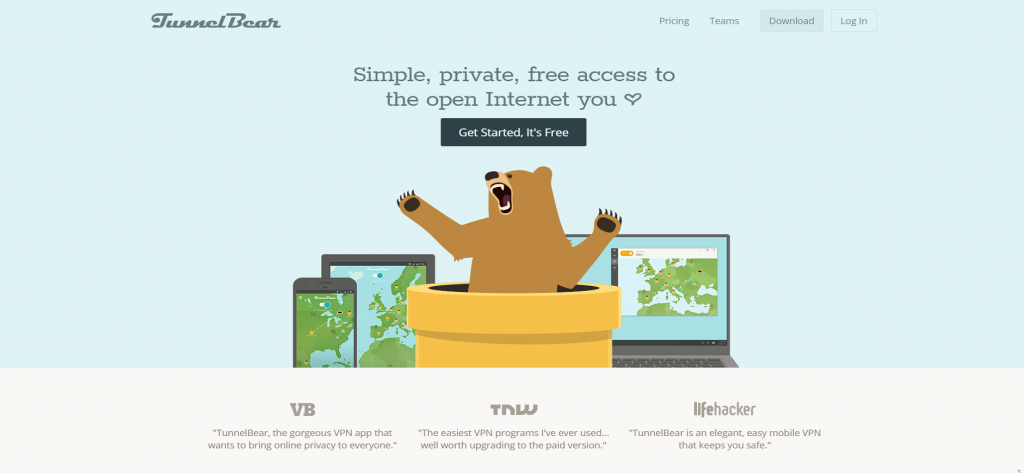
While some people refer to a VPN as a wall, others refer to it as a tunnel, which is where the founders of TunnelBear got the name. As one of the only VPN providers based in North America, this company has its headquarters in Canada. TunnelBear is the only free VPN that we felt was worthy of a spot on our list. Its home page has a cute look that features an adorable teddy bear about to head down the tunnel and explore the world wide web. As long as you have a Mac or a PC and will admit your current location, you can download and install this network.
Not only is TunnelBear completely free, but it’s one of the only systems that does not require that you log in to use it. The makers behind this VPN promise that they will never collect your data or monitor your online activities. With Vigilant Mode, this VPN will actually protect your data when you temporarily lose your internet connection. It will also automatically connect you to a server based on your location, which allows you to more quickly view illicit content. We also like that this VPN has trackers that block hackers from seeing you. In addition to a free option, a premium version is also available for around $5 to $10 per month.
You probably hear people talk about these networks on sites like Reddit and wonder why you should use one for yourself and especially why you should pay for one. Some of the top benefits of using a VPN include:
- More privacy and security: A VPN provides you with extra security as you use the internet. Using a private network will ensure that sites and hackers don’t track your movements.
- Ad blocking: Many people use one of these networks simply because they want to block ads. Search engines note your internet habits and create ads that specifically target you. The right software will block all types of ads.
- Save money: If you lease a phone line for your business, you can use a VPN to save money. A private network helps you save on the cost of long-distance charges and will reduce your overall support costs too.
- Safe download: You can also use a VPN to more safely download games and videos to your computer. The top products will alert you of any issues with the software suite before you download it. You can then use the VPN to access sites that you usually cannot access from your current location.
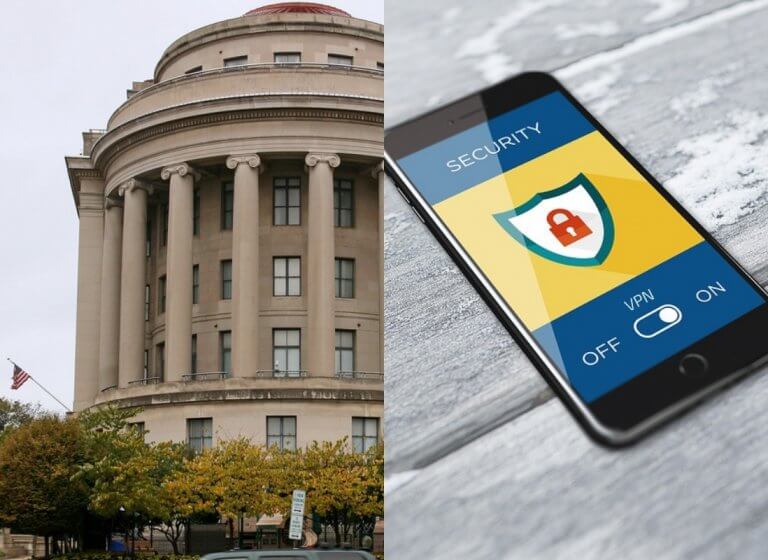
Did You Know?
The Federal Trade Commission actually recommends that consumers use VPNs on their cell phones and other mobile devices that they use to connect to the web.
How a VPN Works
Before choosing a VPN and using it on your computer, you will likely have some questions about the product works. You will typically sign up for the network and create an account with the site or the owner of the network. As long as you have an internet connection, you’ll have no trouble accessing that network. When you want to surf the web more privately, you simply click on the icon of the VPN that you saved on your desktop. This will bring up a window that asks for your account information. Most networks require that you create both a username and a password. You’ll enter that information in the window to continue.
As soon as you click enter, the VPN will send your data to a private server that verifies the information is correct. The server will then encrypt your data and change the information shown to the public and anyone who can access that data. You can shop for products that you don’t want others to know you bought and even visit the dark web without anyone knowing. At the end of your session, you can log back out and use your home network.
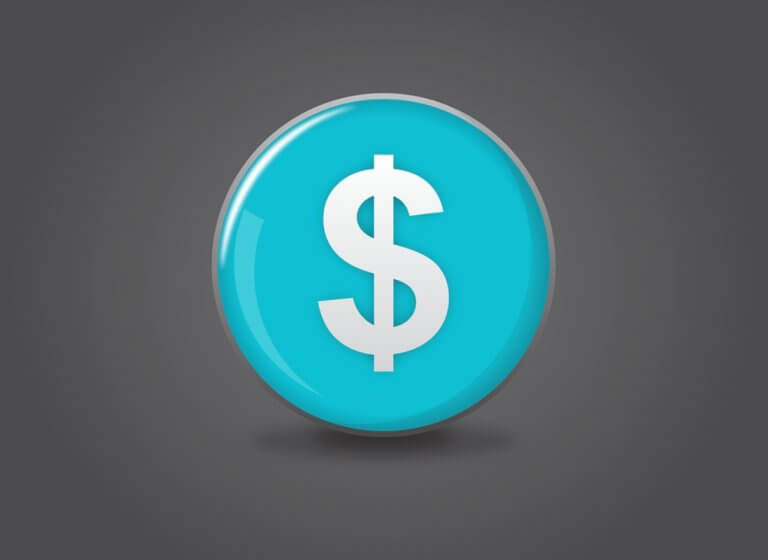
What is a VPN Affiliate?
When you search the web for VPN reviews or the best VPN products for 2018, the odds are good that you’ll come across sites that function as affiliates. Affiliate programs allow people to make money off products they sell on their sites. When a reader makes a purchase through the site, the owner will receive a percentage of the amount purchased. VPN affiliates can provide you with lots of useful information though, especially those that contain links to expert reviews and content.
Using a VPN for Streaming
Apps such as Hulu and Netflix allow you to watch television shows and films at home. Even major networks like CBS and HBO have apps that you can download and use to access popular shows. You may not realize that each company has restrictions in place regarding what you can watch based on your current location. Netflix, for example, has deals with several networks that allow the company to stream certain shows overseas but not in the United States. When you log into your account, the site or app will automatically detect your current location and show you the content available in your country.
With a VPN, you can access more shows and films than you ever thought possible. Many networks allow you to pick the location that you want to share with others. You can set your location to Canada, Australia and any other location around the world. Streaming sites will detect that you changed regions and update the content you can view based on that new location while still letting you use your account information. Many people actually use multiple VPNs and change their locations frequently to access new content that isn’t available in their home countries.
The Top Streaming Apps You Can Use with a VPN
- HBO Go
- CBS All Access
- Hulu
- Netflix
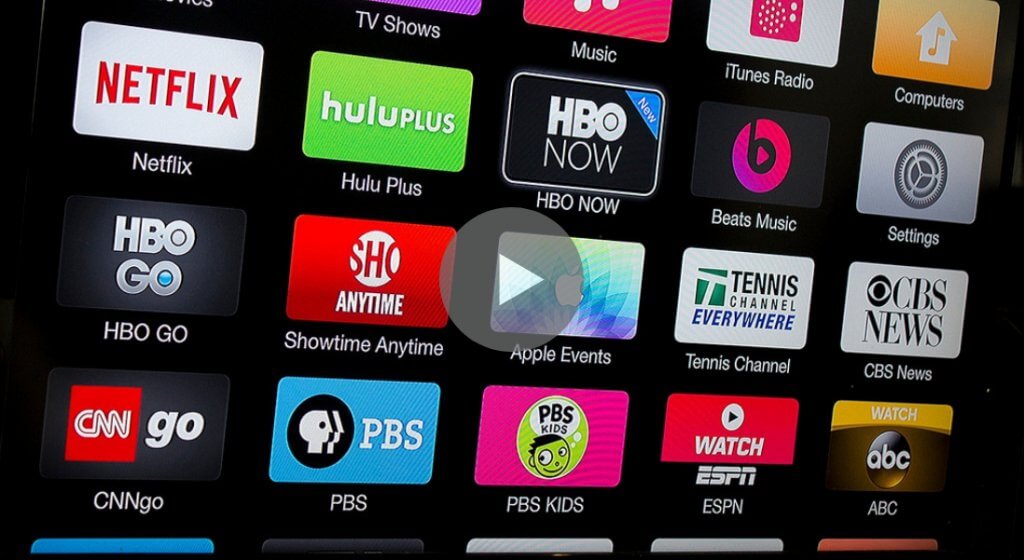
How to Download a VPN
Once you select a VPN, it usually only takes a few steps to set it up and use it on your computer. You can download a copy with any type of web browser. After clicking on the file name, the browser will bring up a new window that asks if you want to save a copy. You will click yes and wait until the download process is done. Depending on your browser, you can click on the upper right-hand side of your screen to view a list of your most recent downloads. You also have the option of searching your computer to find the VPN.
Double-clicking on the file name will bring up a new window that asks if you want to open the file. You will click the yes button and wait for the VPN to start. It can take just five minutes or less for the download to complete, but the process can take much longer based on the size of the file. Many VPNs also give you the option of giving the file a new name and choosing where you want to save it on your computer. When you place the VPN on your desktop, you can easily find it each time you want to increase your privacy.
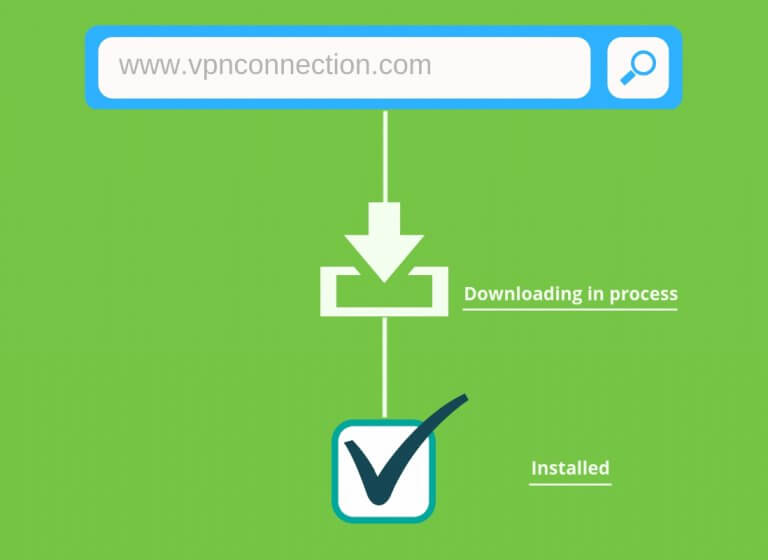
How to Use a VPN
After you download a new VPN, you need to know how to actually use it. Most of the products that we reviewed allow you to bring up a home menu when you double click on the icon of the network. This menu should contain a line at the very top that shows whether you are currently connected to the network and if you have an internet connection. When you click on the servers icon or button, it will load a list of all available networks. You can select one based on the location that you want to use. Some also have a countries icon or button that lets you view the countries you can connect to before you choose a server.
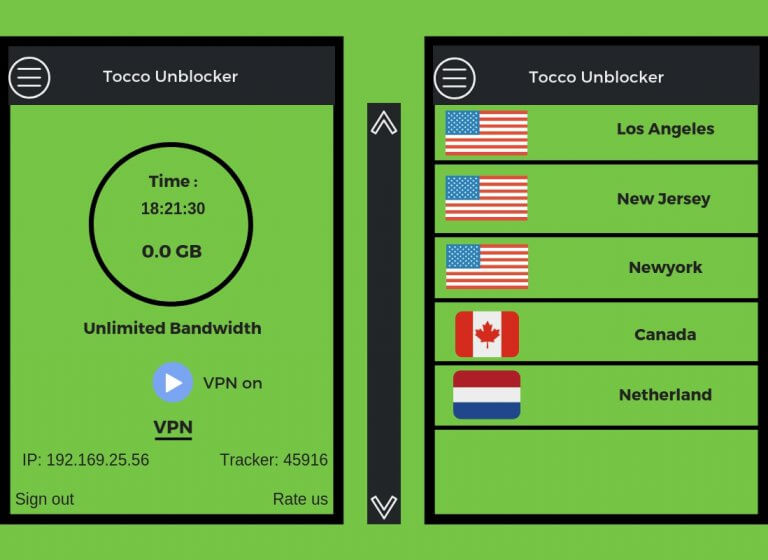
With most VPNs, you can narrow down your search for a network based on factors like current operating speeds and the number of users. This lets you find a network that runs as quickly as you need and one that isn’t overloaded with users. You’ll also find a stats feature that shows you stats relating to your VPN usage in the past and a logs feature that shows you logs of your recent searches and surfs.
Tips for Setting Up a Virtual Private Network
- Choose a service: A VPN isn’t something that you can just create on your own. You need to purchase a plan or sign up for a free service. We walked you through the steps of installing the network in a section above.
- Access your network settings: You can then enter the network settings on your computer and look for the button that lets you add a new connection. After you scroll down past the closest connections to you, you should see the VPN listed.
- Configure the network: When you select the VPN, you will enter the information given to you by the provider. You usually need to enter the username and address that the provider gave you and the name of the service provider.
- Input your password: To separate your account from all the other people using that network, the provider should give you a unique password. You need to enter the password in the appropriate field. As soon as you complete this step, you can click on the connect button and automatically connect to the VPN.
- Connect in the future: Depending on the VPN that you use, you may not need to log in each time that you use the internet. If you are on a public or shared internet connection, you should use the VPN for protection.
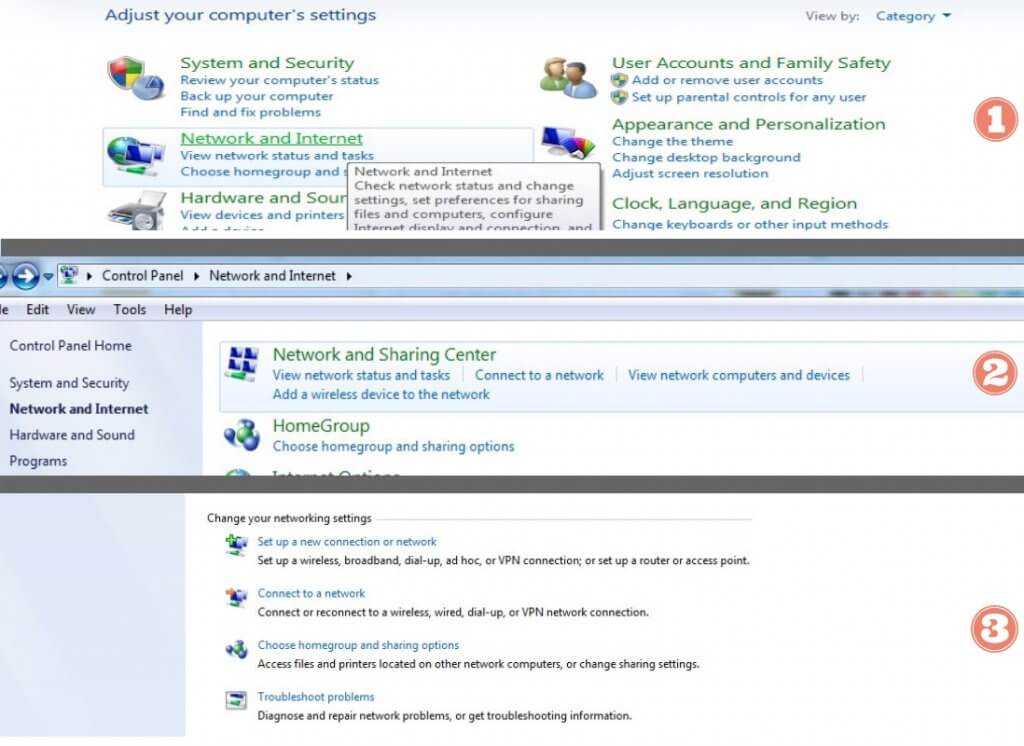
How to Set Up a VPN on Your Phone
- Enter your settings: With Android phones, you can enter your settings after turning on your phone. The settings app will appear on your home screen or in a list of apps.
- Choose the right area: You’ll want to click on the button that says, “Wireless & Networks” and then look for the “More” button. When you click on that button, you can scroll down until you see an icon labeled “VPN.” Most phones will have a plus (+) sign button on the top of the screen. You can click this button to add your information.
- Add the VPN: Enter all the information the provider gave you, including the server address and your username in the boxes that you see on the screen. After this step, you should click on the save button to save the info.
- Future use: If you want to keep the VPN on every time you use your phone, you will click on a button that has three small circles on it. To choose when you use the VPN, you can skip this step and simply turn the VPN on before using a public network.
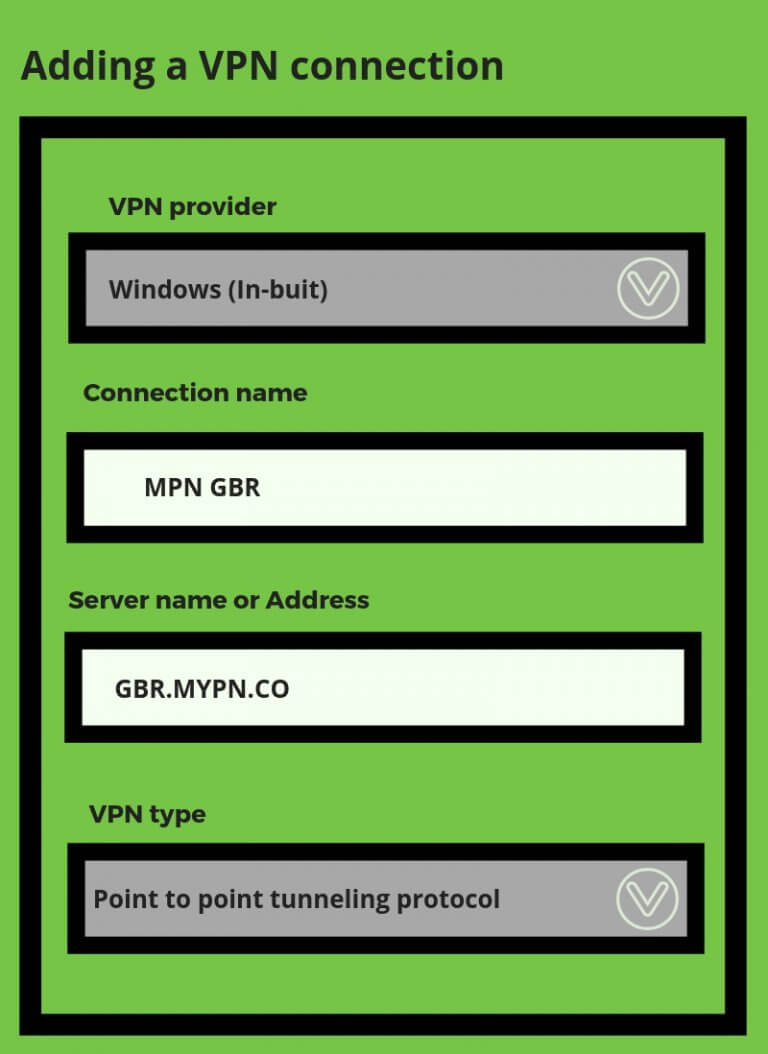
How is a VPN Different From Safe Browsing?
Chrome and other web browsers offer an incognito mode. When you select this mode, the browser will not retain a copy of any of the sites that you visit or any of the searches that you do. With traditional searches, a copy of everything you do stays on that site. Anyone who uses the computer later can check the browser history to see what you did. Some browsers also give you the option of opening a link in a private window. Users with more tech experience can still track your movements online and view the sites you accessed.
A VPN is different because it essentially creates a wall around your online activities. This wall completely surrounds your computer and anything you do on the web. Only the VPN provider knows who you really are and your location. The provider will create a mask that serves as your new IP address. Software designed to track online activity will view the VPN as visiting those sites and watching those videos or playing those games instead of recognizing your computer.
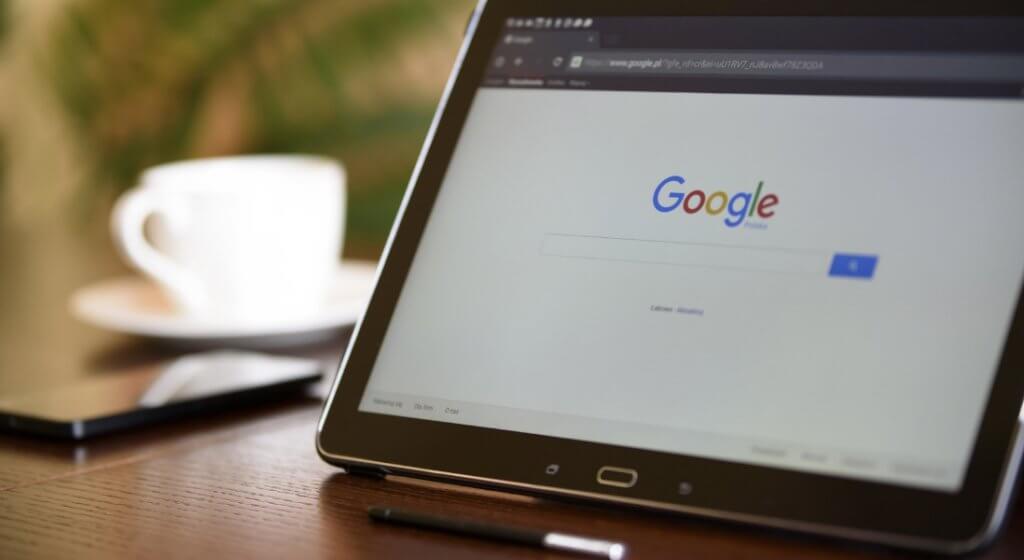
How to Choose a VPN and What to Look For
To find the right VPN for you, we highly recommend that you check out the VPN reviews listed on this page. Those reviews cover all the top features of each one and any downsides or issues that we uncovered. Before looking at the top products though, we want you to understand the features that you should look for and how to choose a VPN. While many of the top products include all these features, some have just a few. You can also get help deciding what factors are the most important to you.
Type of Home Network
One thing you should think about is the type of network that you already have in your home and the devices that you use on that network. When you have a cell phone, you’ll probably connect to it your home’s internet instead of using the data plan offered by your provider. Virtual private networks are also compatible with desktop and laptop computers as well as mobile devices like phones and tablets. You want to ensure that the VPN will work with your existing network and with all your devices. This may require making changes to your router.
Mobile Access
The chances are good that you may want to surf the web while you’re away from home. Many retail shops and restaurants now offer free WiFi through hotspots that you can access from your phone or a similar device. You will find both open networks and private networks that require a password for use. While private connections offer more in the way of protection, anyone can use an open connection. You have no way of knowing who might steal your data. With a good VPN that you download to your mobile device, you’ll get the protection that you need every time you use the internet outside of your home.
Free vs. Paid Networks
Unless you run a business out of your home or need high-level security, you may find that a free network is suitable for your needs. Free networks will work with your existing router and give you updates about the information that you share online. Also called a home server, this is a type of private network that applies solely to the work you do online while connected to your router. If you bank from home and visit sites that you aren’t sure are secure, you’ll want to spend the money on a paid network.
Number of Servers
Companies that offer VPNs use dedicated servers in locations around the world. When you access that network, it automatically changes your IP address to reflect the location of the server that you want to use. It’s important that you look at the number of servers available because this gives you an idea of whether there are enough to accommodate the current number of users. You’ll also want to check the number of servers to find out how quickly or slowly the network will run. When there are fewer servers, you may notice a dramatic reduction in your internet speed.
Location of Servers
While the number of servers available is important, the location of those servers may be even more important, especially if you want to use the network with streaming sites and apps. During the 2018 Olympics, which took place in England, live streaming of popular events was only available to those who lived in the country. Many Olympics enthusiasts used a VPN to change their locations and make the streaming site think they were in England. If you want to access streaming or live content in a specific country, you must make sure that the VPN provider has servers in that country.
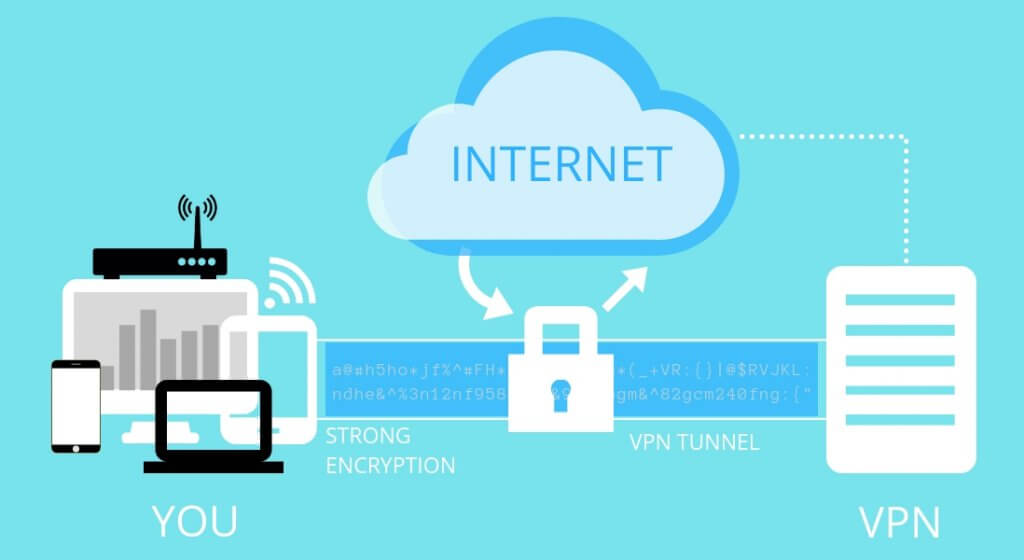
Connection Speed
Connection speed is especially important for users who want a VPN they can use when streaming content. The faster the VPN runs, the easier you can download and watch live streams as well as online content. If the VPN is a little slower, you’ll find that it takes longer to download those videos. When streaming videos, you must also deal with buffering. That little button that you spin around as the content loads can drive you crazy. Connection speeds often vary from one country to the next, but the number of people using that network and the type of router you use can slow down your speed too.
P2P Technology
Peer-to-peer sharing networks offer one of the best ways to find content that you cannot find anywhere else. Also called P2P networks, this type of technology allows others to access your computer when it is on and running. You can also use the technology to find content that others have on their own computers. When using a P2P program, you’ll do a search for torrents and then download the content to your device. If you want to use P2P networks, you must select a VPN that allows for file sharing. Some networks have firewalls that block your computer from others.
Operating System
Though many users prefer either Windows or Mac operating systems, some tech enthusiasts also use Linux operating systems. When selecting a VPN, you must make sure that it will work with that OS. You may find that you need to go in as an administrator and make changes that give the VPN access to the system. If you want a network that you can use on a mobile device, you must find one that works with an Android OS or the system used by iPhone and other Apple products. Unless the provider lists the network as being compatible with that OS, you shouldn’t use it.
Usage Options
We talked about networks that require you log in with a username and password, but that isn’t the only type of network now available. Some new VPN providers now let you create one account and link all your devices to the same account. You can log in one and use the VPN each time you head online. This saves you the hassles of entering your information several times a day and makes it easier for you to get online protection. If you have a hard time remembering your passwords or don’t want to create yet another password, this type of VPN might be best for you.
Data Limits
If you own a cell phone, you know that watching videos and shopping online can wreak havoc on your data plan. Phone providers charge you a set rate each month and give you a certain amount of data for that price. When you connect your phone to your home network, you can use your internet provider’s data instead.
VPN providers sometimes place a data limit or cap on their services too. Instead of letting you use the product as often as you would like, you can only use 500MB of data within a single month. If you want a VPN specifically for streaming and/or playing video games, you need to ensure that you get coverage for all the data that you use in a month.
General Reputation
The best way to avoid scam networks and potentially dangerous providers is with a look at the general reputation of each company. You can look at reviews online from reputable sites to see what they say about those companies, but you can also use the information available here on our page. After going over what to look for and important features of virtual private networks, we’ll give you a list of the best tools on the market. You may want to look at reviews just to make sure that you don’t pick a provider that might steal your data or sell your information.
Number of Devices Supported
An important thing to look at when you live in a home with multiple users is the number of devices that the network can support. Many of the free products we saw will only support a single device at a time, which means you’ll need to download multiple network products to use them with your phones and computers. Paid services typically support three devices up to a maximum of six or even nine devices. You may want to check with the company to see if it charges a fee when you want to add a larger number of devices to the network.
Dangers of Free Networks
The cost of a VPN can range from just a few dollars a month to hundreds of dollars a year. While you might feel tempted to choose a free product, you should consider the downsides of using those networks. Think about it this way: if the company doesn’t make money from the sale of its products, how does it make money? Tech companies aren’t creating and releasing new products out of the goodness of their owners’ hearts. They want to make as much money as possible.
Though a free VPN may let you change locations and access servers in major companies, those networks can also track your movements and keep track of your data. The company behind that network can then sell your information to the same people you want to avoid. Many retail companies purchase web use information to get an idea of what shoppers look at online. That data helps them create new ads that target specific types of shoppers. Free products may also contain built-in ads that will pop up each time you use the network or ads that run while you use the internet. WPBuffs has done some thorough analysis on the best free VPN for your consideration if you’re still interested in a non-paid version.
How to Change Your Location Settings
A common problem that many beginners have is that they don’t know how to change their location settings when using a VPN. When you first set up the network, you have the option of selecting a location based on the location of the server that you want to use. You can use that same server for months without making any changes to your account. If you want to change that location because you want to access new content only available in select countries, you’ll need to enter the settings on your network.
After double-clicking and opening the VPN software, look across the menu at the top of the screen to find the button labeled country. Depending on the VPN, this button may say location. You can then click on the button and load all countries currently available. Select a new location before clicking on the update button to save the change. You can follow the same steps each time that you want to update your network.
WARNING!
Streaming services will notice each time that you change your region and will keep track of those changes. If you frequently change your location, the site may temporarily block your account for using the service or completely ban your account.
Though we wanted to go over some of the basic info that you need when buying and using a VPN, we also wanted to take a detailed look at the top products around. We turned to the experts at CNET, PC World and other top websites to find out which products they recommend. After making a list of more than 100 networks, we compared their expert ratings to the ratings that everyday users posted to find the top options. All of the following services are among the best VPNs for 2018 and beyond. You’ll find services that you can use for years of protection in the future.
Should You Pay for a VPN and How Much to Pay?
In our section on the dangers of using a free VPN, we talked about the risk of those services, including how some providers will sell your information and others will keep track of the data that you don’t want to share. We highly recommend that you buy a VPN from a provider that promises it will not collect, share, sell or spread your data. While some of the products on our list of the best for 2018 include those from companies who do collect some data, those companies are upfront about how they will use your information and what data they log.
While we recommend choosing a paid service, we encourage you to find a service that fits your budget. If you want to sample different services to see which one is best for your home or business, you can use the free trials that many companies offer or pay for a week or a month of service. You’ll usually pay around $10 to $20 per month for a VPN. When you sign up for an annual plan, the company will charge you a flat rate ahead of time that equals out to around $10 or less per month.
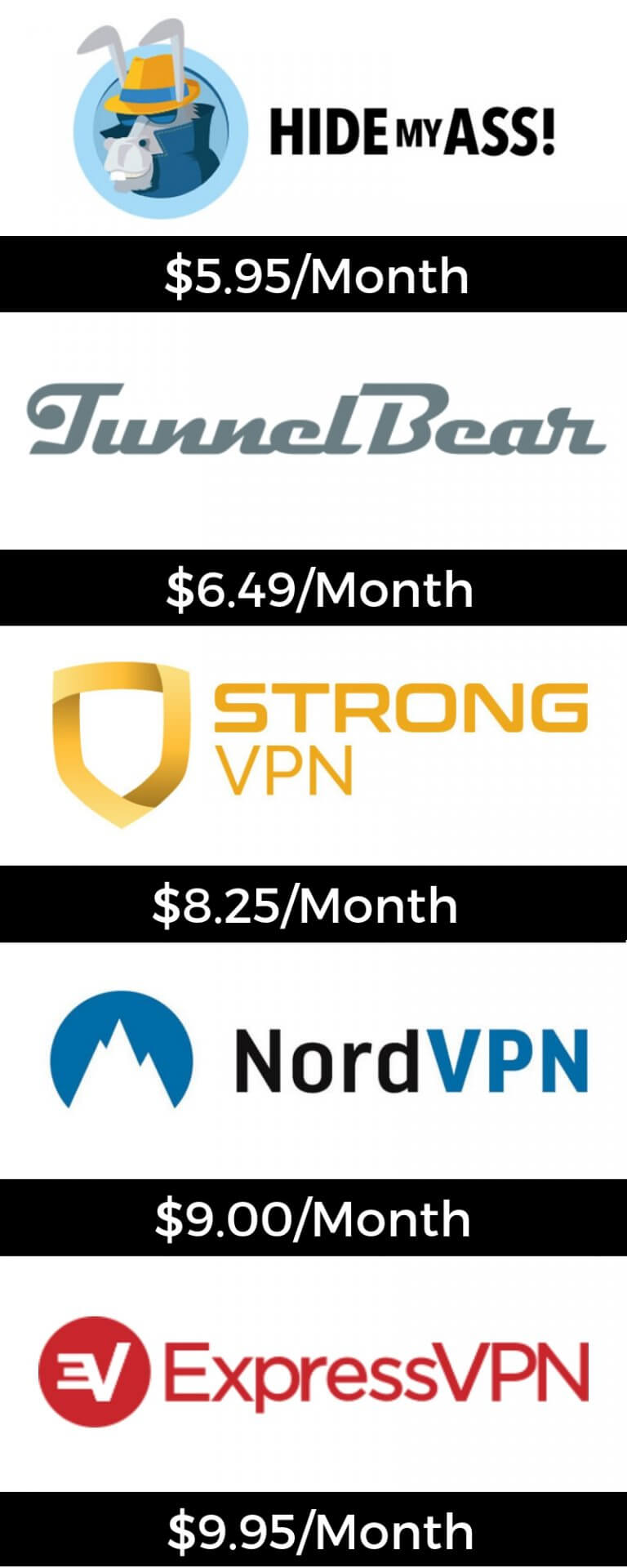
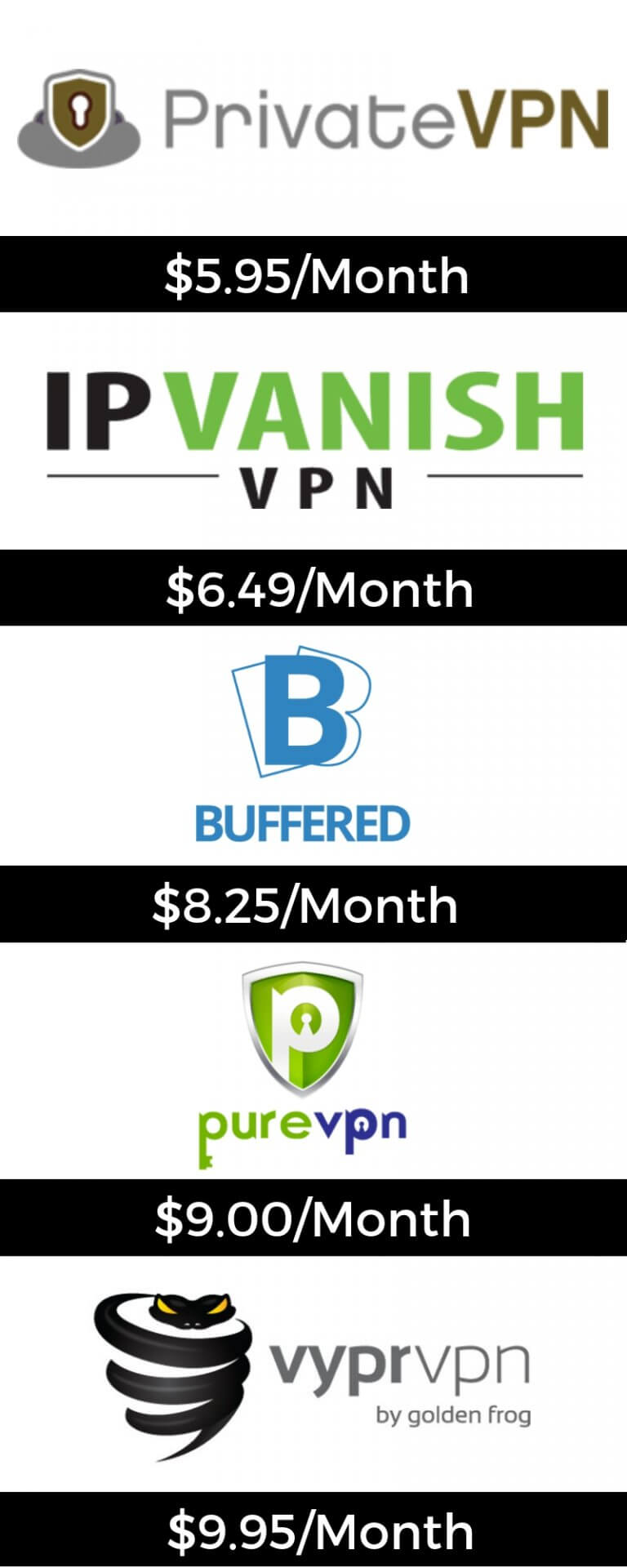
Frequently Asked Questions
A: Streaming apps like Netflix use different amounts of data based on what you watch. When watching a standard video, you’ll use at least 1GB of data for each hour that you stream. If you watch a high-definition video, you’ll use at least 3GB of data per hour.
A: Many paid VPNs come with a built-in kill switch feature. When you select this feature, it automatically kills your internet connection. This is an important feature for those who use torrents and file sharing networks, especially in regions where that activity is illegal. When you kill your connection, you make it almost impossible for someone to find your location.
A: While a VPN can protect the government and internet service providers from tracking you online, these networks usually will not keep you safe from hackers. A hacker can still access your computer through an unsecured network. TunnelBear and other VPN providers actually offer tracking services that monitor hackers and other prospective threats online. Those services will work with your antivirus software to keep you safe.
Related Reviews
We have access to thousands of products, and have meticulously and personally hand selected the very best for you to check out.
The team that worked on this review
Our team of experts are here to provide honest
reviews for best products.
reviews for best products.

Kush
Editor &
Content Writer

Johanna
Chief Designer &
Program Manager

France
Front-end
Developer




